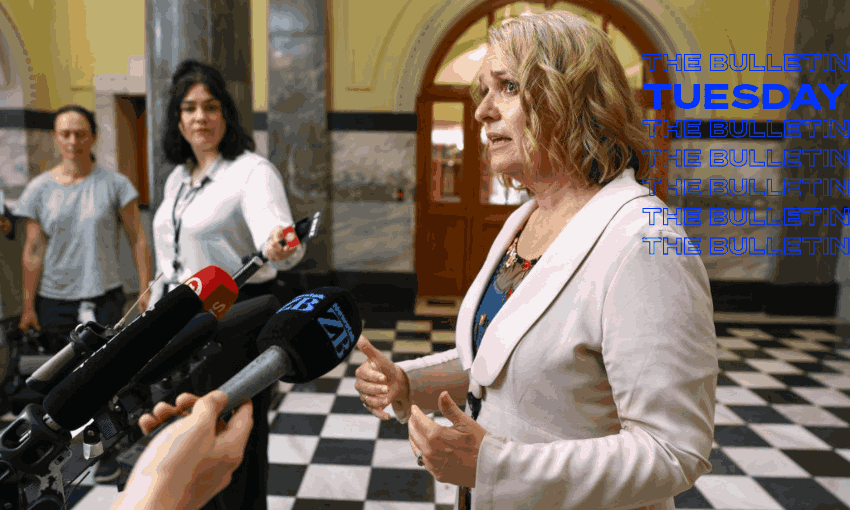How is a white supremacist eligible to run for a school board?
The associate minister of education is seeking urgent advice about the eligibility of Philip Arps to run for the board of trustees at a Christchurch school. Should we have seen this issue coming?
In today’s edition: claims mayoral candidate has outstanding debt of $353,000; women sanctioned by MSD penalised again; Auditor-general critical of cost of living payment; but first, the grey area on eligibility for board of trustee elections.
Jan Tinetti confirms there is “grey area” around eligibility for board of trustees elections (Getty Images)
Legislation does not address extreme views of potential board members
In 2018 the Tomorrow’s Schools independent taskforce noted that “some principals, board members and people who worked with schools had seen previously well-functioning boards and schools undermined by new trustees with particular personal agendas.” Fast forward to 2022 and we’re now in a “grey area” about whether a white supremacist with a criminal conviction is eligible to stand for the board of trustees at Te Aratai College, formerly called Linwood College in Christchurch. The Education and Training Act 2020 includes a number of restrictions on who can stand for a board but a barrister and solicitor has said the Act does not address extreme views of potential board members.
How is there a “grey area” about Philip Arps’ eligibility to stand when he’s a convicted criminal?
Listening again to associate education minister Jan Tinetti’s interview with Kim Hill yesterday morning, Hill pressed Tinetti for the “rules” about who might be ineligible to stand in the first place. There does seem to be a “grey area” on the issue and Tinetti is seeking urgent advice on the matter. At the moment, the rules are the same as any board of a crown entity as outlined in the Crown Entities Act. Similar criteria is outlined in the Education and Training Act. You can see where the ambiguity might lie in the case of Arps when you look at both Acts.
Principals worried about number of people who are anti-Covid prevention measures standing
The ineligibility sections reference being convicted of an offence punishable by imprisonment for a term of two years or more, or being sentenced to imprisonment for any other offence, unless that person has obtained a pardon or served the sentence. Arps was sentenced to 21 months in prison in June 2019, released on bail in January 2020 and has breached his bail conditions multiple times. Arps’ bid isn’t the only one causing concern for principals. The Principals Federation told RNZ it was worried by the number of people standing for school boards who were opposed to Covid prevention measures.
Should we have seen this coming?
For two years, the media in the US has been documenting the plans of right-wing conspiracy groups to run for places on school boards and in local elections. Toby Manhire first brought attention to the plans to do the same here, on The Spinoff at the beginning of this month. Since then, we’ve had a cascade of stories regarding concerns about candidates standing in the upcoming local elections. The Herald's Jarrod Gilbert (paywalled) recently wrote that what is happening in New Zealand shouldn’t come as a surprise. Tinetti doesn’t want to “rush” a code of conduct for school boards that was part of legislation enacted in August 2020. And yet we find ourselves explaining how it is that Philip Arps might be eligible to run for a position of governance at a school where 63% of the kids identify as Māori, Asian or Pasifika.
The change-makers of tomorrow will need to be willing to act outside of the status quo; to find new paths, then empower people to follow them. Created by The Mind Lab, the Master of Change and Organisational Resilience is a new programme designed to grow and nurture this next generation of decision makers.The programme blends theory and practice; you’ll learn to build future-focused frameworks for anticipating and responding to change in and around your organisation. The first intake begins in October – sign up for the online info session on September 12 to learn more. (Sponsored)
Email claims Auckland mayoral candidate has outstanding debt of $353,000
Last night the Herald (paywalled) published details of claims that Auckland mayoral candidate Viv Beck had a planned campaign budget of $4m. An email also claims Beck still has an outstanding debt of $353,000 with the agency that was formerly looking after her digital marketing. The campaign spending cap for mayoral candidates in Auckland is around $680,000 but is only counted for the last three months of the campaign. Last week news broke that Beck had parted ways with that agency and was now working with the agency used by former mayoral candidate Leo Malloy, the Campaign Company. The company's director and shareholder is Jordan Williams, who is the executive director of the Taxpayers' Union and the Auckland Ratepayers' Alliance. Beck said she was "extremely disappointed" the issue had been made public when work had been underway to resolve the dispute.
Women who were wrongly sanctioned by MSD now dealing with tax implications
As Checkpoint’s Lisa Owen reported last night, women who were wrongly sanctioned by the Ministry of Social Development for not naming the father of their child, are now being hit with tax bills for the refunds they received. In April 2020 the government scrapped the deduction which was described as "harmful". These women are now being hit with unexpected tax implications – income tax, student loan repayment requirements and loss of working for family tax credits as the refunds they received pushed them into higher tax brackets. Beneficiary advocates “reckon that stinks”. A legal opinion sought by Auckland Action Against Poverty says the refund should be exempt from knock-on tax implications. Revenue minister David Parker said he has asked officials to develop a solution.
The Spinoff Members is a community dedicated to supporting quality, homegrown journalism.
From our newsletters and podcasts, to our coverage of te ao Māori and political reporting – the support of readers like you makes this work possible and helps to ensure it remains freely available to all. If you can, please consider making a contribution today.
Cost of living payment checks introduced
The government announced yesterday that it was introducing new checks to determine eligibility for the second cost of living payment due on September 1. The announcement arrived on the same day as criticism from the auditor-general about the scheme. Listening to Checkpoint on the way home last night someone texted in to say there had been too much focus on those who had received the payment but weren’t remotely eligible. They were self-employed meaning the IRD might not have a record of their earnings from last year if they haven’t filed a tax return. They can still receive it once the IRD has assessed their income. You could then flip the argument and posit that there also hasn’t been much focus on those who received the payment, were entirely eligible and possibly in need of it.
Click and collect
Fake judge from mock trial at parliament stood down from job with a prominent health provider.
Report recommends more funding for MPs.
Gaurav Sharma urged to move on by former staff member after posting a 4,700 word essay on Facebook last night.
The women of Gloriavale testify in employment court.
It may not be possible to repatriate the body of the soldier who was killed fighting in Ukraine.
Got some feedback about The Bulletin, or anything in the news? Get in touch with me at thebulletin@thespinoff.co.nz.
If you liked what you read today, share The Bulletin with friends, family and colleagues.
Toby Manhire meets Wellington mayor Andy Foster in the first of a series of candidate interviews. Liz Kivi talks to an international transport expert who says the government has been fooled into embracing “green” hydrogen. Airana Ngarewa remembers Hana Te Hemara’s Māori language petition, 50 years on. Stuff's Andrea Vance reveals the top gambling regulator who spread Covid misinformation and tried to shut down the vaccine rollout. And Stewart Sowman-Lund tastes something slightly off in the new season of Great Kiwi Bake Off.
Tall Blacks qualify for world cup
The New Zealand men’s basketball team beat Jordan 100-72 last night to qualify for their sixth Fiba world cup. The world cup will be held across the Philippines, Japan and Indonesia next year. Yesterday marked the 20th anniversary of the Tall Blacks finishing fourth at the 2002 world championships. Stuff’s Marc Hinton describes it as a sporting Cinderella tale of epic dimensions in an oral history of that moment in time.
“Q’s encroachment into local politics was its biggest mainstream growth vector in the post-Trump era”
A long read related to today’s lead. Mike Rothchild on Lit Hub unfurls the encroachment of conspiracy theory and political movement QAnon into local body politics in the US. “Local Action = National Impact'' is a slogan coined by QAnon hero General Michael Flynn. Rothschild writes that at one June 2021 conference, Flynn raged against the school board machine, thundering, “We cannot allow school boards to dictate what is happening in our schools. We dictate that.”










